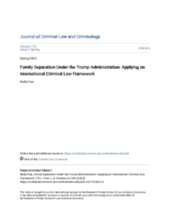INTRODUCTION
Children representing themselves in court. Mothers frantically calling government agencies in order to find their missing kids. Rows of children sleeping on mats in warehouse-like facilities surrounded by wire fences. Wailing fathers pleading with immigration agents. Hundreds of thousands of people marching nationwide with signs that read, “Where are the children?” These are the images that dominated news cycles in the United States and abroad in summer 2018 during what some called the Trump Administration’s “Family Separation Policy.” The U.S. government separated more than 2,800 immigrant children from their parents, and the public outrage was palpable.
Some domestic legal organizations managed to channel their rage into federal lawsuits. The American Civil Liberties Union even brought a case that got a federal ruling ordering the Trump Administration to reunite the children with their parents. The facts of the class action concerned a mother and her seven-year-old daughter, who were detained thousands of miles apart from one another after seeking asylum in the U.S. from violence in the Democratic Republic of the Congo. Despite the court order to reunite eligible families by July 12, however, some children were still separated from their parents months later. Others are not allowed to be reunited based on their parents’ alleged criminal histories. The problem of family separation is still ongoing—and it will likely continue for months, perhaps years.
Nonetheless, domestic law is not the only legal method to fight the Trump Administration’s 2018 policy. After all, the international response to family separation occurring in the United States was nearly equally as powerful. Renowned world leaders such as former British Prime Minister Theresa May, Canadian Prime Minister Justin Trudeau, and Pope Francis all publicly denounced family separation. International bodies like the United Nations also condemned the practice. The former United Nations High Commissioner for Human Rights, Zeid Ra’ad al-Hussein, publicly declared the policy “unconscionable” days after his office released a press briefing stating, “the practice of separating families amounts to arbitrary and unlawful interference in family life . . . .” International law, specifically international criminal law, also has a role to play in denouncing the Trump administration’s policy.
This Comment will propose a theoretical international criminal law response to the family separation that occurred in summer 2018. In particular, the analysis will focus on the potential response of the International Criminal Court (ICC)—a permanent intergovernmental organization and autonomous international tribunal that prosecutes individuals for atrocity crimes—to the United States’ Zero Tolerance Policy, announced in April 2018 by former Attorney General Jeff Sessions. The Comment will conclude that the ICC could theoretically prosecute Trump Administration officials for crimes against humanity due to their involvement with the Zero Tolerance Policy and its effects of family separation.

